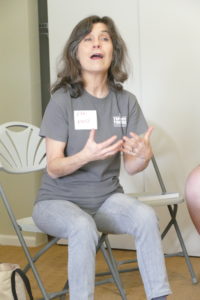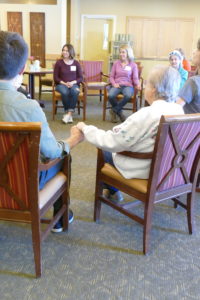Dementia-friendly improv could make a difference
Some wonderful things happened Monday afternoon at Highgate Senior Living when Pam Nolte, a founder of Taproot Theater in Seattle, demonstrated the power of improv in stimulated the brains and memories of individuals in our community who have Alzheimer’s.
In a one-hour session, Nolte worked with six residents and ten local actors to demonstrate how the art of improv can stimulate memories and foster meaningful human connection that can reignite memories and improve the quality of life for residents.
There were many sweet moments at this session. When Highgate resident Mary sat down next to actor and educator Mark Wavra, she reached out and held his hand. Residents and actors played word games, tossed a ball around and even said “thank you” to each other using gibberish. Nolte said gibberish is a wonderful way to help individuals who are struggling with putting words together be part of the experience.
The joy that these residents experienced can last several days, Nolte said, which improves not only their lives but also those of caregivers.
The beauty of improv is that it is based on the concept that you accept whatever the person before you offered and add to it with your own contribution. It’s the philosophy of always saying, “yes, and…” Everything is right and nothing is wrong.
This workshop offered a peek inside a growing movement in this country to reconnect those with Alzheimer’s and dementia using simple techniques adapted from this art, but the point is creating connection, not comedy. It also destigmatizes the condition.
Nolte talked about the kinds of memories that can be stimulated over time with simple improv techniques — emotional memories, childhood memories and what she called procedural memories, which are muscle memories of riding bicycles or dancing.
As the brain contracts in the early stages of the disease, those memories and the feelings can be stimulated and that’s what the simple improv techniques are designed to bring out. I was interested to learn that those with memory issues actually can be really good at improv because they tend to be uninhibited, Nolte said. Being silly is what it’s all about.
Often, those who are providing care will, with the best of intentions, correct Alzheimer’s patients when what they are saying isn’t accurate. Nolte said the improv approach is to ignore whether what they are saying is right or wrong and focus on encouraging them to keep interacting. With the brain’s neuroplasticity, these interactions can presumably help keep those connections to memories and give them a greater quality of life.
Developing Alzheimer’s Cafés in this area would also be a great benefit. Restaurants typically offer to serve Alzheimer’s individuals and caregivers exclusively during a few hours once a month during off-peak hours. This creates a safe space for those families and benefits the restaurant.
Numerica Performing Arts Center has, under Cadman’s direction, been focused on being a community center with a stage rather than just a place to see shows. Working with those who have memory issues is the latest iteration of that philosophy. The PAC’s first phase began with inviting memory care facilities in the valley to bring patients to what he calls dementia-friendly movies.
The second phase is exploring whether we could develop local resources to do improv work based on the curriculum that has been developed at Taproot Theater and elsewhere to improve the quality of life for our neighbors who are struggling with those challenges.
Being a community means we look for ways to help those less fortunate and create a sense of belonging for everyone. Improv is a tool for connection that we ought to support.
If you would like to learn more or support this effort, contact Cadman at [email protected].
There were many sweet moments at this session. When Highgate resident Mary sat down next to actor and educator Mark Wavra, she reached out and held his hand. Residents and actors played word games, tossed a ball around and even said “thank you” to each other using gibberish. Nolte said gibberish is a wonderful way to help individuals who are struggling with putting words together be part of the experience.
The joy that these residents experienced can last several days, Nolte said, which improves not only their lives but also those of caregivers.
The beauty of improv is that it is based on the concept that you accept whatever the person before you offered and add to it with your own contribution. It’s the philosophy of always saying, “yes, and…” Everything is right and nothing is wrong.
This workshop offered a peek inside a growing movement in this country to reconnect those with Alzheimer’s and dementia using simple techniques adapted from this art, but the point is creating connection, not comedy. It also destigmatizes the condition.
Nolte talked about the kinds of memories that can be stimulated over time with simple improv techniques — emotional memories, childhood memories and what she called procedural memories, which are muscle memories of riding bicycles or dancing.
As the brain contracts in the early stages of the disease, those memories and the feelings can be stimulated and that’s what the simple improv techniques are designed to bring out. I was interested to learn that those with memory issues actually can be really good at improv because they tend to be uninhibited, Nolte said. Being silly is what it’s all about.
Often, those who are providing care will, with the best of intentions, correct Alzheimer’s patients when what they are saying isn’t accurate. Nolte said the improv approach is to ignore whether what they are saying is right or wrong and focus on encouraging them to keep interacting. With the brain’s neuroplasticity, these interactions can presumably help keep those connections to memories and give them a greater quality of life.
Developing Alzheimer’s Cafés in this area would also be a great benefit. Restaurants typically offer to serve Alzheimer’s individuals and caregivers exclusively during a few hours once a month during off-peak hours. This creates a safe space for those families and benefits the restaurant.
Numerica Performing Arts Center has, under Cadman’s direction, been focused on being a community center with a stage rather than just a place to see shows. Working with those who have memory issues is the latest iteration of that philosophy. The PAC’s first phase began with inviting memory care facilities in the valley to bring patients to what he calls dementia-friendly movies.
The second phase is exploring whether we could develop local resources to do improv work based on the curriculum that has been developed at Taproot Theater and elsewhere to improve the quality of life for our neighbors who are struggling with those challenges.
Being a community means we look for ways to help those less fortunate and create a sense of belonging for everyone. Improv is a tool for connection that we ought to support.
If you would like to learn more or support this effort, contact Cadman at [email protected].



